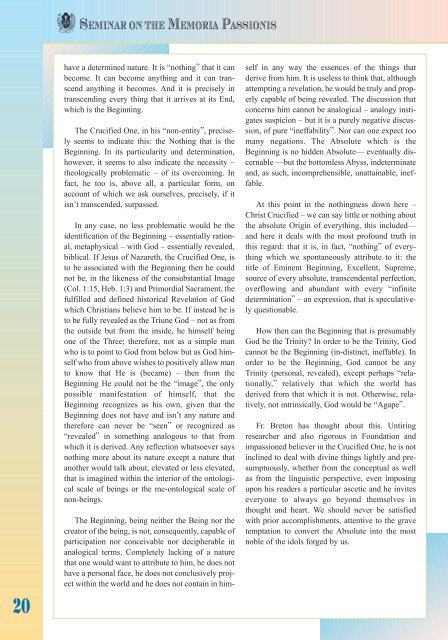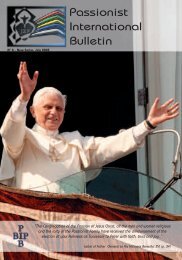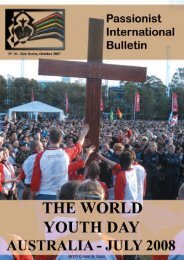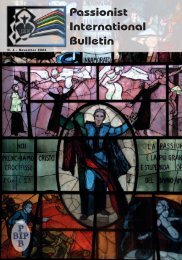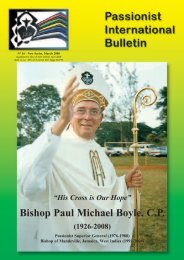Passionist International Bulletin
Passionist International Bulletin
Passionist International Bulletin
Create successful ePaper yourself
Turn your PDF publications into a flip-book with our unique Google optimized e-Paper software.
seminar on the memoria passionis20have a determined nature. It is “nothing” that it canbecome. It can become anything and it can transcendanything it becomes. And it is precisely intranscending every thing that it arrives at its End,which is the Beginning.The Crucified One, in his “non-entity”, preciselyseems to indicate this: the Nothing that is theBeginning. In its particularity and determination,however, it seems to also indicate the necessity –theologically problematic – of its overcoming. Infact, he too is, above all, a particular form, onaccount of which we ask ourselves, precisely, if itisn’t transcended, surpassed.In any case, no less problematic would be theidentification of the Beginning – essentially rational,metaphysical – with God – essentially revealed,biblical. If Jesus of Nazareth, the Crucified One, isto be associated with the Beginning then he couldnot be, in the likeness of the consubstantial Image(Col. 1:15, Heb. 1:3) and Primordial Sacrament, thefulfilled and defined historical Revelation of Godwhich Christians believe him to be. If instead he isto be fully revealed as the Triune God – not as fromthe outside but from the inside, he himself beingone of the Three; therefore, not as a simple manwho is to point to God from below but as God himselfwho from above wishes to positively allow manto know that He is (became) – then from theBeginning He could not be the “image”, the onlypossible manifestation of himself, that theBeginning recognizes as his own, given that theBeginning does not have and isn’t any nature andtherefore can never be “seen” or recognized as“revealed” in something analogous to that fromwhich it is derived. Any reflection whatsoever saysnothing more about its nature except a nature thatanother would talk about, elevated or less elevated,that is imagined within the interior of the ontologicalscale of beings or the me-ontological scale ofnon-beings.The Beginning, being neither the Being nor thecreator of the being, is not, consequently, capable ofparticipation nor conceivable nor decipherable inanalogical terms. Completely lacking of a naturethat one would want to attribute to him, he does nothave a personal face, he does not conclusively projectwithin the world and he does not contain in himselfin any way the essences of the things thatderive from him. It is useless to think that, althoughattempting a revelation, he would be truly and properlycapable of being revealed. The discussion thatconcerns him cannot be analogical – analogy instigatessuspicion – but it is a purely negative discussion,of pure “ineffability”. Nor can one expect toomany negations. The Absolute which is theBeginning is no hidden Absolute— eventually discernable—but the bottomless Abyss, indeterminateand, as such, incomprehensible, unattainable, ineffable.At this point in the nothingness down here –Christ Crucified – we can say little or nothing aboutthe absolute Origin of everything, this included—and here it deals with the most profound truth inthis regard: that it is, in fact, “nothing” of everythingwhich we spontaneously attribute to it: thetitle of Eminent Beginning, Excellent, Supreme,source of every absolute, transcendental perfection,overflowing and abundant with every “infinitedetermination” – an expression, that is speculativelyquestionable.How then can the Beginning that is presumablyGod be the Trinity? In order to be the Trinity, Godcannot be the Beginning (in-distinct, ineffable). Inorder to be the Beginning, God cannot be anyTrinity (personal, revealed), except perhaps “relationally,”relatively that which the world hasderived from that which it is not. Otherwise, relatively,not intrinsically, God would be “Agape”.Fr. Breton has thought about this. Untiringresearcher and also rigorous in Foundation andimpassioned believer in the Crucified One, he is notinclined to deal with divine things lightly and presumptuously,whether from the conceptual as wellas from the linguistic perspective, even imposingupon his readers a particular ascetic and he inviteseveryone to always go beyond themselves inthought and heart. We should never be satisfiedwith prior accomplishments, attentive to the gravetemptation to convert the Absolute into the mostnoble of the idols forged by us.


